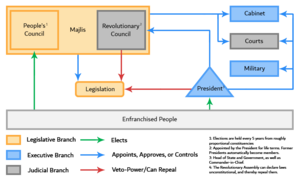Riadiya
This article is incomplete because it is pending further input from participants, or it is a work-in-progress by one author. Please comment on this article's talk page to share your input, comments and questions. Note: To contribute to this article, you may need to seek help from the author(s) of this page. |
Riadiyan Republic الجمهورية الريادية (Sahrabic) al-Jumhūrīyah ar-Riadīyah | |
|---|---|
|
Flag | |
| Capital and largest city | Azar |
| Official languages | Sahrabic |
| Demonym(s) | Riadiyan |
| Government | Unitary presidential constitutional republic |
| Yusuf Salman | |
| Legislature | Majlis |
| Revolutionary Council | |
| People's Council | |
• Density | 106.6/km2 (276.1/sq mi) |
| GDP (nominal) | 2018 estimate |
• Per capita | NS$17,044.17 |
| Gini | 42.7 medium |
| HDI | 0.787 high |
| Currency | Riadiyan Dinar (ݛ) (RDD) |
| Date format | dd/mm/yyyy |
| Driving side | right |
| ISO 3166 code | RD |
| Internet TLD | .rd |
Riadiya (/riːɑːdiːjə/ Sahrabic: رياديا Riadīya), officially known as the Riadiyan Republic (Sahrabic: الجمهورية الريادية al-Jumhūrīyah ar-Riadīyah), which literally translates as the "Pioneer Republic", is a country located in...
Etymology
The Sahrabic name رياديا Riadīya originated as a colloquialism in the country's early history. It was popularized as a formal name during the heightened nationalism of the Riadiyan Revolution.
The name itself does not mean anything in Sahrabic. It began as a colloquial abbreviation for the Pioneer Company (Sahrabic: الشركة الريادية aš-Šārikat ar-Riadīyat), the joint-stock company originally tasked with the colonization of Riadiya. The abbreviation may have an origin in foreign trade and immigration, as it's thought that the suffix -ia may be borrowed from an Ahromance language.
History
Pre-colonization
The Pioneer Company
The Emirate
Revolutionary Riadiya
Contemporary history
Geography
Government and politics
The Riadiyan government is composed of three branches:
- Legislative: The bicameral Majlis, made up of the Revolutionary Council and the People's Council, makes the laws.
- Executive: The President is the commander-in-chief of the military, can veto decisions made by the Majlis, and generally acts as the Chief Executive Officer of the Riadiyan Republic.
- Judicial: The Supreme Court and appellate courts, whose judges are appointed by the President and the Majlis, and courts of first instance, elected by the communities in which they operate, interpret and apply the laws.
The People's Council is directly elected by the people of Riadiya. Elections use first-past-the-post and are held every five years in districts of similar population, which the President has the responsibility of apportioning. All bills originate in the People's Council, but the President may, in practice, also propose bills when a special session is called. Bills are passed by a simple majority.
The members of the Revolutionary Council are appointed to life terms by the President. The Revolutionary Council has the power to veto and, with the approval of the People's Council, amend legislation. It has a broad purpose of revising bills passed by the People's Council, being an advisor to the People's Council through the process of creating legislation, and ensuring that legislation adheres to the laws set forth in the Constitution and the will of the people. While originally the Revolutionary Council was made up of high-profile revolutionaries from the Riadiyan Revolution, now it is generally made up of well-respected judges, scholars, religious leaders, and statesmen, many of whom have come out of retirement to take a position.
The President holds supreme executive authority as Riadiya's commander-in-chief. The President is also the chief diplomat, is responsible for organizing the census and apportioning the constituencies that elect the People's Council, can summon the Majlis or either of its houses to a special session, and call referenda to amend the Constitution. The President also holds some legislative power, with the de facto power to propose bills and the power to veto bills which have passed the Majlis.
Parties
Riadiyan Party
Workers' Party
Islamic Community
Minor Parties
Law
Riadiya has a hybrid legal system with characteristics deriving from both civil law and fiqh. It often bears a resemblance to common law in practice.
There is a tiered system of courts, with the Supreme Court as the highest court. The Supreme Court and other appellate courts are appointed with the approval of the Majlis and the President, while courts of first instance are elected by local communities. Judges often come to decisions singlehandedly, as courts use an inquisitorial system rather than an adversarial one, but appellate courts generally consist of a panel of judges.
The Revolutionary Council acts primarily, in its judicial capacity, as Riadiya's constitutional court. The Revolutionary Council has the sole power to ensure adherence to the Constitution by the rest of the government, and so can nullify laws it deems unconstitutional or compel the government to fulfill its constitutional duties. It is not restricted to ruling on cases and conflicts and may issue legal opinions at any time.
The Revolutionary Council also has original jurisdiction in all cases involving members of the People's Council or the President and has the sole power to impeach members of the Majlis or the President.
Foreign relations
Military
The Riadiyan Armed Forces consists of land, sea, and air forces. Military service in Riadiya is considered a constitutional right, and able adult male citizens of Riadiya are permanent members of the Riadiyan militia.
Although historically the Constitution has been interpreted as requiring a sort of universal conscription, the Revolutionary Council has since interpreted mandatory membership in the militia as, in practice, a constitutional right to keep and bear arms. As such, present-day Riadiya has an all-volunteer army and no active military conscription.

